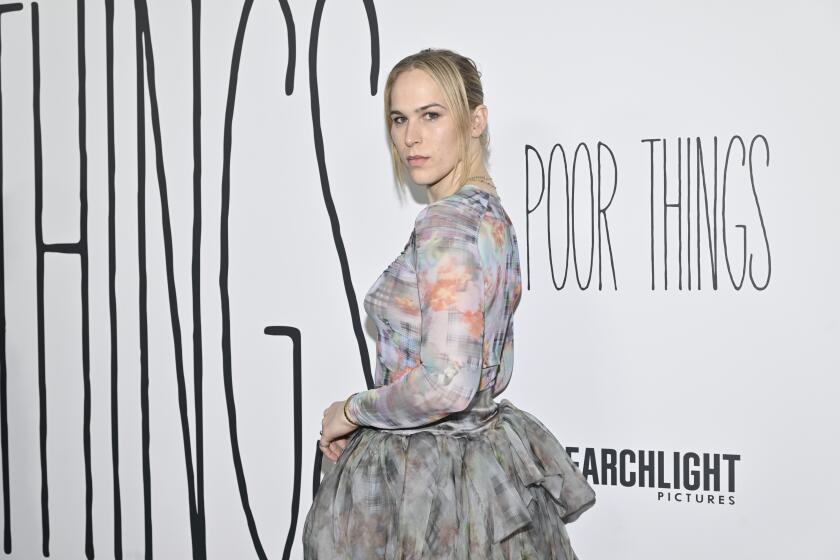Basic Cable, Network TV Chip Away at Carlin’s Seven Dirty Words
Detective Vic Mackey is not a very nice man. A rogue TV cop in the grand tradition of rogue TV cops, Mackey (Michael Chiklis) dispenses his own brand of street justice, roughing up perps and intimidating informants. And gosh oh golly, can he ever swear.
On “The Shield,” a new series on cable’s FX network, Mackey bags the bad guys with a vocabulary that would shock Dirty Harry. He describes a drug suspect as a certain bodily orifice. He uses a common expletive, twice, and refers to a sex act in no uncertain terms.
And this before the first commercial break on the first episode.
That “The Shield” is a weekly series on basic cable, available in almost 80% of U.S. television homes, says something about the state of profanity on television. Mostly it is this: Just when it seems that TV networks are drawing the line, they move the line again.
In “A Season on the Brink,” a made-for-TV movie carried on ESPN last month, basketball coach Bobby Knight (played by Brian Dennehy) drops the F-word 15 times in the first 15 minutes. MTV’s “The Osbournes,” about a real-life family, is so riddled with crude words that the bleeps almost outnumber the audible words. In recent months, a crass word for “jerk” has popped up on “The Practice,” “NYPD Blue” and “ER.”
Viewers who subscribe to HBO may be used to such things, what with that network’s foulmouthed gangsters, convicts and single gals (“The Sopranos,” “Oz,” “Sex and the City,” respectively). But HBO’s customers pay monthly fees to receive programs that are more explicit than those on the rest of TV. The news here is that the rest of TV is closing the gap: Basic cable and broadcast--the most widely available form of television--are getting increasingly down and dirty.
Even the previously sacrosanct “family hour” (8-9 p.m.) isn’t inviolate. Between 1996 and 2001, the frequency of profanities roughly tripled on the leading networks during the hour once set aside for feel-good fare like “Little House on the Prairie,” according to the Parents Television Council, an organization that monitors TV content. Fox rang up almost four crude words per hour on average, most among the Big Four (Fox, CBS, NBC and ABC), the PTC said.
Some believe the process has been driven by “Sopranos” envy--a desire by producers to mimic the critically acclaimed HBO series. The groundbreaking show is casually laced with the kinds of words that George Carlin once said could never be mentioned on TV.
“Honestly, there’s a real frustration among writers and directors that they don’t get to play with the same toys as those in pay TV,” said Bryce Zabel, a producer who is chairman of the Academy of Television Arts & Sciences.
But Dick Wolf, producer of the “Law & Order” programs on NBC, rejects that argument: “It all comes back to storytelling,” he said. “There are no bad words in Shakespeare, and he seems to have done all right.”
Caught in the middle, network executives say what’s acceptable is necessarily a moving target, etched in sand, not stone. As social mores evolve, they say, television is always hustling to keep up.
“In the last [few] years, certain words have become more a part of the culture,” said Martin Franks, who oversees CBS’ standards and practices department. “In a world in which eighth- and ninth-grade schoolyards are filled with more words than we’d allow on our air, at some point you have to ask who is protecting whom, and from what.”
That is, in fact, much the way the federal government sees it. When he was asked recently at a broadcast industry convention whether the Federal Communications Commission had been lax in enforcing regulations aimed at “indecent” speech on radio and TV, FCC Chairman Michael Powell responded: “This is an increasingly diverse society. Claiming there is just one community today is just not true.... Our society is supposed to be strong enough to sustain” a diversity of views.
Up until the early 1980s, the three leading networks subscribed to a common code, making TV content reasonably uniform in tone. But this was abandoned under antitrust pressure from the federal government and independent broadcasters. Since then, each network has been free to define its own notions of acceptable behavior and language. The process has become increasingly complicated by competition; each network now has to weigh its decisions against those of dozens of competitors.
Fox’s prime-time viewers are younger than CBS’ and therefore, the network says, more tolerant of profanity. “In the proper context, if some [swear word] is well motivated and germane to the story, there is an acceptance by our core audience,” said Roland McFarland, Fox’s chief censor. McFarland said context, experience and audience expectations guide Fox’s review of scripts. The rule of thumb: Don’t surprise or jar viewers with something they didn’t expect to hear.
Viewers hardly seem exercised by the increasing trash talk. Network representatives say offensive language ranks low on the list of things that viewers complain about--far behind the two biggest bugaboos, program preemptions and cancellations.
ESPN’s experience with “Season on the Brink” suggests audiences may be ready for even more profanity. ESPN showed two versions of its movie simultaneously--one uncut on ESPN, another on ESPN2 with the salty language excised.
Viewers chose the foulmouthed Knight over his bleeped-out twin by a margin of nearly 7 to 1.
Is everything up for grabs? Fox’s McFarland says no, that strong taboos remain in place against racist or sexist insults. “That is where we truly draw the line,” he said. “We take great care in eliminating that” from Fox programs.
The complete guide to home viewing
Get Screen Gab for everything about the TV shows and streaming movies everyone’s talking about.
You may occasionally receive promotional content from the Los Angeles Times.



